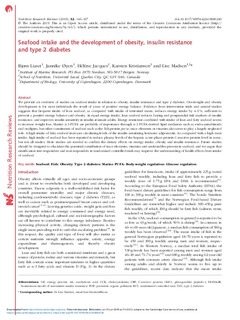| dc.description.abstract | We provide an overview of studies on seafood intake in relation to obesity, insulin resistance and type 2 diabetes. Overweight and obesity development is for most individuals the result of years of positive energy balance. Evidence from intervention trials and animal studies suggests that frequent intake of lean seafood, as compared with intake of terrestrial meats, reduces energy intake by 4–9 %, sufficient to prevent a positive energy balance and obesity. At equal energy intake, lean seafood reduces fasting and postprandial risk markers of insulin resistance, and improves insulin sensitivity in insulin-resistant adults. Energy restriction combined with intake of lean and fatty seafood seems to increase weight loss. Marine n-3 PUFA are probably of importance through n-3 PUFA-derived lipid mediators such as endocannabinoids and oxylipins, but other constituents of seafood such as the fish protein per se, trace elements or vitamins also seem to play a largely neglected role. A high intake of fatty seafood increases circulating levels of the insulin-sensitising hormone adiponectin. As compared with a high meat intake, high intake of seafood has been reported to reduce plasma levels of the hepatic acute-phase protein C-reactive protein level in some, but not all studies. More studies are needed to confirm the dietary effects on energy intake, obesity and insulin resistance. Future studies should be designed to elucidate the potential contribution of trace elements, vitamins and undesirables present in seafood, and we argue that stratification into responders and non-responders in randomised controlled trials may improve the understanding of health effects from intake of seafood. | nb_NO |
